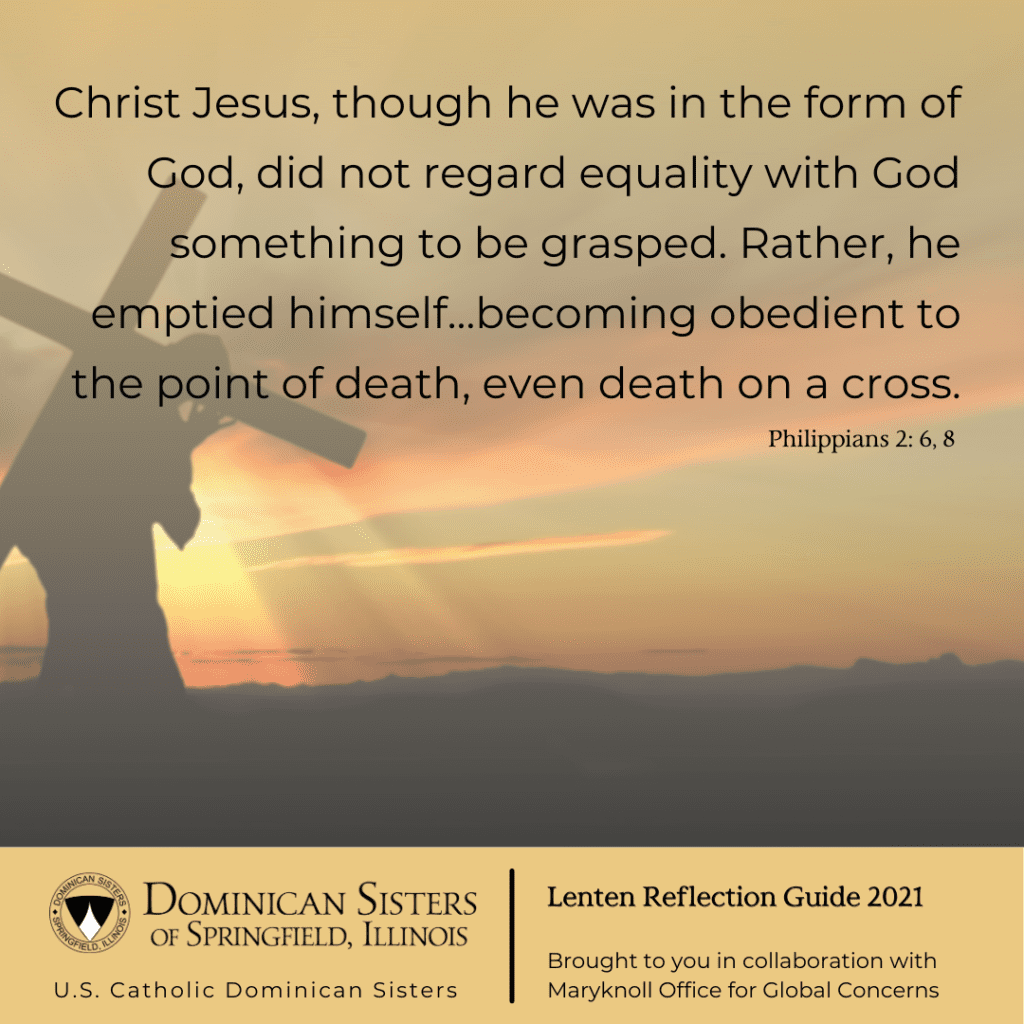“Christ Jesus, though he was in the form of God, did not regard equality with God something to be grasped. Rather, he emptied himself…becoming obedient to the point of death, even death on a cross.” - Philippians 2: 6, 8
In this last week of Lent we reflect on the readings for the Passion, read on Palm Sunday, this time from the Gospel of Mark. We hear the stories of the Last Supper, of Jesus’ agony and betrayal, and his crucifixion and burial. We are left waiting for the conclusion – the joy of the Resurrection.
Although these stories are familiar to us, this week we can step back and recall just how stunning and groundbreaking this foundational Christian narrative is: that Jesus – God incarnate – would allow himself to be betrayed, humiliated, and put to death. And that his rising from the dead would then allow all humanity access to eternal life, along with the renewal of all Creation.
Jesus’ death is the ultimate act of nonviolence – the refusal to capitulate to the logic of violence and power, instead revealing the power of sacrificial love as the foundation of life in God.
Holy men and women throughout the ages have shown us what it looks like to live lives of nonviolent and sacrificial love, following Jesus’ example.
Throughout his papacy and especially in Fratelli Tutti, Pope Francis highlights the example of St. Francis of Assisi.
“In the world [at the time of St. Francis], bristling with watchtowers and defensive walls, cities were a theatre of brutal wars between powerful families, even as poverty was spreading through the countryside. Yet there Francis was able to welcome true peace into his heart and free himself of the desire to wield power over others. He became one of the poor and sought to live in harmony with all (4).”
St. Francis shocked his society by his refusal of wealth and power in order to embrace the poverty and humility of Christ. With God’s grace, we, too, can be prophetic witnesses of a different way of living.
Pope Francis goes on to reflect on how the logic of violence, retribution, security, and power dominate our world today. Specifically, he points out the horror of ongoing wars and states that, given the technology and scope of modern warfare, “it is very difficult nowadays to invoke the rational criteria elaborated in earlier centuries to speak of the possibility of a ‘just war.’ Never again war!” (258)
Likewise, he states clearly his opposition to the use and very possession of nuclear weapons, writing that true peace cannot be dependent on mutual ability to annihilate one another. Finally, he reiterates that the use of the death penalty makes no sense in a world where it is possible to keep society safe without it.
This week, as we reflect on Jesus’ passion and prepare to celebrate the Resurrection, let us pray that the spirit of humility, nonviolence, and perfect love which Jesus modeled may permeate our entire lives. May we help bring his reign of peace into the world.
Question for Reflection
- How does the life of St. Francis of Assisi challenge you?
- In what ways can we welcome true peace into our hearts?
Living Lent
Pray
Watch the video of the Peace Prayer of St. Francis and reflect on the how to better be an instrument of peace.
Fast
This week, and perhaps into the Easter season, commit to refraining from acting on feelings of anger toward those around you. If you are filled with anger or frustration, practice taking a walk, taking quiet time, or retreating into prayer. Let the anger subside and then decide how to respond.
Act
Urge the Biden administration to take steps further steps to reduce the United States’ nuclear arms and work toward a nuclear-free world.
Maryknoll Missioner Experience

“On one occasion after a bombing in our area of Narus, South Sudan, Sister Madeline McHugh and I sat under the trees with about 12 women for prayer and debriefing. We used the Scripture for the coming Sunday from Luke’s Gospel, chapter 6, where Jesus says we are to love our enemies. I asked the group how we would describe an enemy. Most of the women said that their enemy was the Khartoum fundamentalist Muslim government soldiers who were bombing them.
Then one woman said: ‘I believe my enemy is someone who has wounded my heart, but whose wounds I do not know.’ She went on to say: ‘Maybe, if I can know the person’s story better, especially to know the person’s wounds, and the person can know my wounds, we would not be an enemy to each other.’ The theology of the Sudanese women has deepened my faith, compassion, and forgiveness.”
– Sr. Theresa Baldini, MM, South Sudan
*Thank you to the Maryknoll Office for Global Concerns for permission to share this Lenten Guide at springfieldop.org.
Fifth Week of Lent: Photo of Sr. Theresa Baldini, MM, and a South Sudanese family courtesy of the Maryknoll Sisters.


